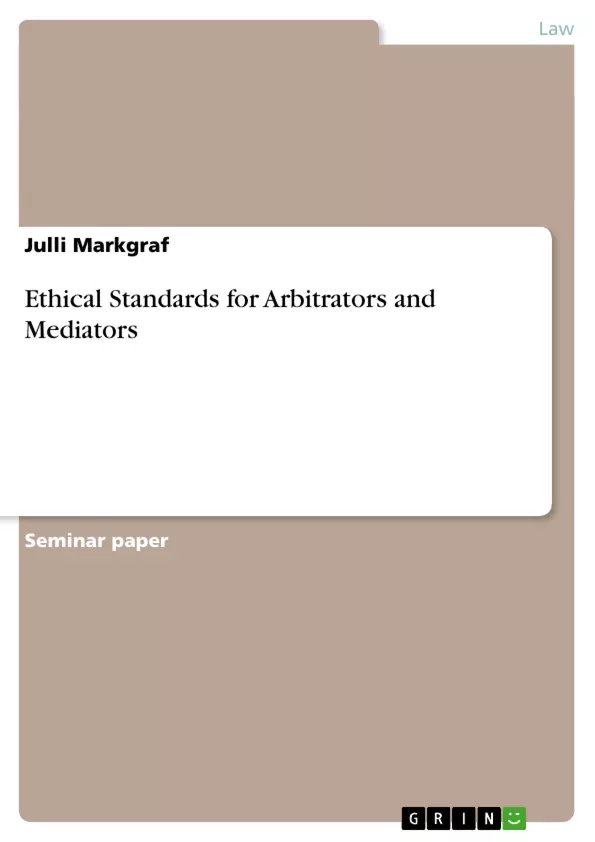While the discussion about vocational standards continues, numerous
associations have drafted competence and ethical standards for either
mediators or arbitrators as well as for both procedural methods.
Ethical standards focus more on the procedural process and the
duties and virtues of the leader of the procedure than on the
occupational competence standardization, such as codes of practice,
benchmarks, agreements, models and exemplars which are the
“classical” forms of standards for practices.5
Codes of practice determine the vocational rules of a profession,
which may contain penalty regulations for misconduct. Benchmarks
are a set of options which orient on successful approaches which have
been proved in a certain professional field. Agreements focus on the
“Agreement to Mediate” which the parties voluntarily agree on when
using ADR. Models are preconceived rules or assessing criteria, which
can be adopted to centralize the standardization approach. Exemplars
are the collection and evaluation of successful ADR cases, which can
be optionally awarded.6
Predominantly, ethical standards appear as an appendix of codes of
practice, wherein certain etiquettes, virtues and qualities of the
procedural leader are determined.
5 NADRAC, A Framework for ADR Standards, p. 52-55.
6 NADRAC, A Framework for ADR Standards, p. 52-55.
Inhaltsverzeichnis (Table of Contents)
- Introduction
- Abstract
- Objective of the paper
- Procedure of Analysis
- ADR Standards
- Distinction between Arbitration and Mediation
- Definition Arbitration
- Definition Mediation
- Role of Ethics
- Ethical Standards within other professions and occupations
- Are standards necessary?
- Summary
- Comparative Perspective
- Ethical Standards for Arbitrators
- Ethical Standards for Mediators
- Comparative Approach
- Conclusion
Zielsetzung und Themenschwerpunkte (Objectives and Key Themes)
This paper explores the ethical standards for arbitrators and mediators within the context of alternative dispute resolution (ADR). It examines the differences between arbitration and mediation, highlighting the distinct roles and responsibilities of each neutral party. The paper aims to determine whether arbitrators and mediators have the same, similar, or diverse ethical obligations. It also assesses the necessity and relevance of establishing ethical standards for both professions.
- The rise of alternative dispute resolution (ADR) and its prominence in resolving both domestic and international disputes.
- Distinction between arbitration and mediation, including the roles and responsibilities of the neutral party in each process.
- The importance and relevance of ethical standards in ADR, and how they relate to professional ethics in other fields.
- Comparative analysis of ethical standards for arbitrators and mediators, examining similarities and differences in their ethical obligations.
- Discussion on the need for establishing and implementing ethical standards for ADR practitioners.
Zusammenfassung der Kapitel (Chapter Summaries)
- Introduction: This chapter introduces the concept of ADR and its growing importance in resolving disputes, specifically highlighting arbitration and mediation as key forms. It briefly outlines the objectives and methodology of the paper, focusing on the need for examining ethical standards for both arbitrators and mediators.
- ADR Standards: This chapter dives into the key features of ADR standards, differentiating between arbitration and mediation and outlining their respective definitions. It then delves into the role of ethics in ADR, exploring its relevance compared to other professions and ultimately addressing the necessity of implementing standards.
- Comparative Perspective: This chapter focuses on a comparative analysis of ethical standards specifically for arbitrators and mediators. It examines existing ethical standards for each profession, identifying similarities and differences in their ethical obligations. This chapter also examines the practical implications of the comparative approach, considering how different ethical frameworks can impact the practice of ADR.
Schlüsselwörter (Keywords)
This paper focuses on the core concepts of alternative dispute resolution (ADR), specifically arbitration and mediation. It explores the ethical standards guiding these procedures and examines the differences between these two methods. Key terms include ethical standards, arbitrators, mediators, dispute resolution, comparative analysis, and professional ethics.
Frequently Asked Questions
What is the main objective of this paper?
The paper explores and compares the ethical standards for arbitrators and mediators within the framework of alternative dispute resolution (ADR).
How does the paper distinguish between arbitration and mediation?
It defines both terms and highlights the distinct roles and responsibilities of the neutral party in each process, noting that their ethical obligations may differ.
What are "Codes of Practice" in ADR?
Codes of practice are vocational rules that determine the conduct of a profession and may include penalty regulations for misconduct by practitioners.
Why are ethical standards necessary for ADR practitioners?
Ethical standards focus on the procedural process and the virtues of the leader, ensuring fairness and professional integrity in resolving domestic and international disputes.
What are "Exemplars" in the context of ADR standards?
Exemplars are collections and evaluations of successful ADR cases that serve as models or benchmarks for quality practice in the field.
- Citar trabajo
- Julli Markgraf (Autor), 2003, Ethical Standards for Arbitrators and Mediators, Múnich, GRIN Verlag, https://www.grin.com/document/22517



